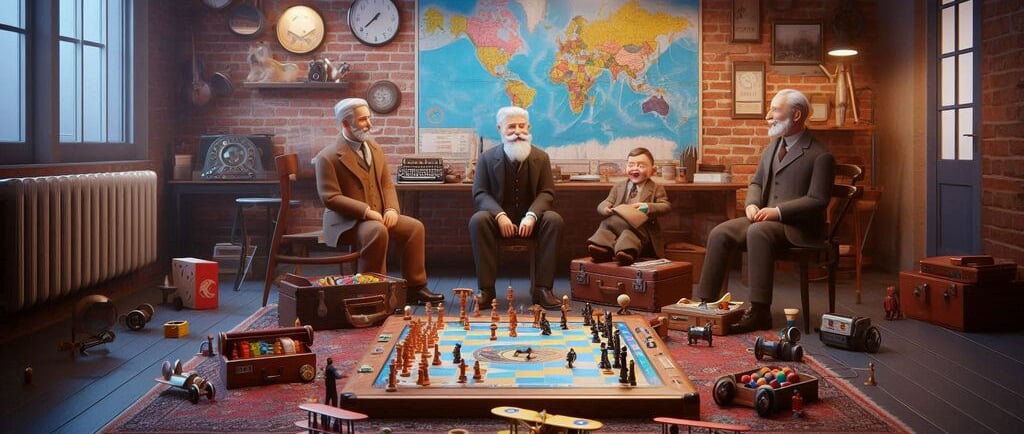Let us collaborate to foster global growth and development together.
Toys & Educational Games
Discover the power of toys & educational games to engage, inspire, and educate. Explore how these tools can boost cognitive development in fun and creative ways.
11/16/20074 min read


Discover the power of toys & educational games to engage, inspire, and educate. Explore how these tools can boost cognitive development in fun and creative ways.
Toys & Educational Games: The Perfect Blend of Fun and Learning
Finding the right balance between fun and learning for your child can be challenging. However, toys and educational games are key in sparking curiosity, creativity, and cognitive development. These tools not only entertain but also help children develop essential skills like problem-solving, critical thinking, and teamwork.
In this article, we’ll explore the benefits of toys and educational games, how to choose the best ones for your child, and some top recommendations.
Why Toys & Educational Games Matter
While fun is essential in a child’s life, it’s equally important for their growth and development to be nurtured through learning experiences. Here's why toys and games play an essential role in early childhood education:
1. Enhance Cognitive Skills
Educational games are designed to stimulate a child’s brain, helping them develop problem-solving skills and memory retention. Puzzle games, for example, improve spatial awareness and attention to detail.
2. Promote Emotional and Social Growth
Board games and group activities teach children how to interact with peers, share, take turns, and manage emotions—valuable lessons they’ll carry through life.
3. Foster Creativity
Building blocks, art kits, and other creative toys give children the tools to unleash their imagination. These hands-on activities also develop fine motor skills and help young minds express their ideas visually.
Top Types of Educational Toys & Games
With so many options available, it can be overwhelming to choose the best educational toys. Here’s a breakdown of popular types:
1. STEM Toys (Science, Technology, Engineering, Math)
STEM toys focus on cultivating a love for science, technology, engineering, and math. These toys are designed to spark curiosity and teach the basic principles behind these concepts in a fun and engaging way.
Example: Robotics kits allow kids to learn how machines work, while chemistry sets help children grasp basic chemistry concepts safely at home.
2. Puzzle Games
Puzzles are an excellent way to sharpen cognitive abilities such as reasoning and problem-solving. Whether they’re solving jigsaw puzzles or playing logic games, children develop critical thinking skills that enhance their academic abilities.
Example: Simple shape recognition puzzles for toddlers and more complex puzzles for older children can improve memory and problem-solving.
3. Arts & Craft Kits
Creative arts and crafts kits can teach children about color, texture, and different techniques. These games support imaginative thinking and help children learn perseverance and patience.
Example: Craft sets where kids can create their own jewelry or clothing items boost fine motor skills and offer an opportunity for creative self-expression.
4. Interactive Books
Books are essential for fostering reading and comprehension. Interactive books take this one step further by including features like sounds or movable parts, keeping children engaged while learning about colors, letters, and basic concepts.
How to Choose the Best Toys & Educational Games for Your Child
When shopping for educational toys and games, it’s essential to select ones that are age-appropriate and meet your child’s development stage. Here are some tips to guide your decision-making:
1. Match the Toy to Your Child’s Interests
Your child’s curiosity plays a massive role in how engaged they will be. For example, a child interested in space exploration may enjoy a rocket-building kit, while a child with an artistic flair might prefer painting and drawing supplies. Select toys that align with their passions to ensure they remain excited to learn.
2. Opt for Open-Ended Toys
Look for toys that encourage free play and don’t have just one purpose. Toys like building blocks or magnetic tiles allow children to build, re-build, and get creative without limitations, fostering unlimited learning opportunities.
3. Consider Longevity
You want to choose toys and games that have lasting value, whether they grow with your child or can be used repeatedly. A quality toy with varying difficulty levels or adjustable features keeps children learning and challenged as they age.
Benefits Beyond the Basics
In addition to improving cognitive and social skills, educational toys and games offer a wealth of long-term benefits for children. Here are some extras you may not have expected:
1. Encouraging Self-Confidence
Mastering a challenging toy or game can significantly boost your child’s self-esteem. When they complete a puzzle or finish an art project, they gain a sense of accomplishment and pride that transfers to other areas of their lives.
2. Reducing Screen Time
With the prevalence of tablets and video games, finding educational toys that don’t require screens can be crucial for your child’s development. Engaging toys like puzzles, building sets, and role-playing kits encourage active play and reduce the temptation of passive screen time.
3. Encouraging Family Bonding
Educational games often include multiplayer options, providing opportunities for family time. Board games or team challenges help children learn about collaboration and competition, creating fun opportunities for connection.
Conclusion: Empower Your Child’s Growth Through Play
There’s no denying that toys and educational games play an important role in a child’s development. From cognitive abilities to emotional intelligence, these learning tools contribute to building well-rounded, curious, and engaged young individuals.
With so many great options available, choosing the right educational toys can be a rewarding experience. Be sure to match toys to your child’s interests and abilities, and choose ones that grow with them. From interactive STEM sets to artistic crafts, there’s something for every curious mind.
What educational toys or games have you found to be most impactful? Share your thoughts in the comments below and check out more tips on fostering creativity in children here!
Innovation
Cutting-edge solutions for industrial efficiency and productivity.
© 2024. All rights reserved.


